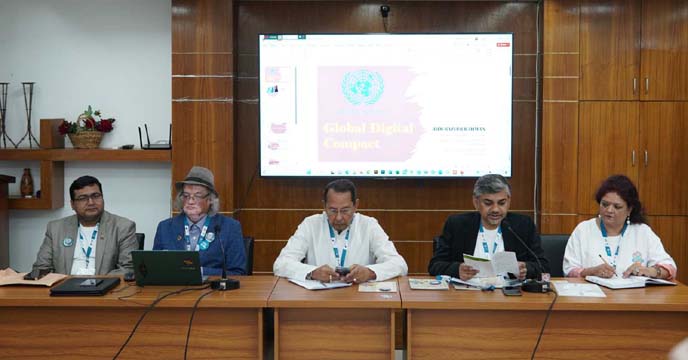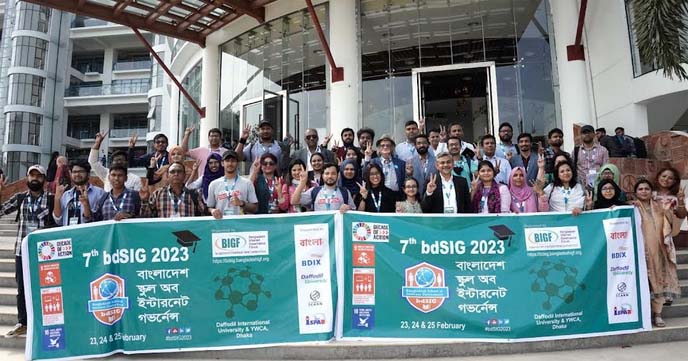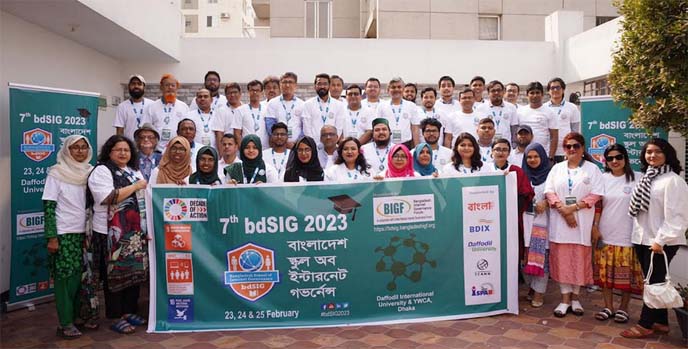৭ম বাংলাদেশ স্কুল অব ইন্টারনেট গভর্নেন্স সমাপ্ত

নিজস্ব প্রতিনিধি : বাংলাদেশ ইন্টারনেট গভর্নেন্স ফোরাম (বিআইজিএফ) এর উদ্যোগে তিনদিনব্যাপী (২৩-২৫ ফেব্রুয়ারি ২০২৩) সপ্তম বাংলাদেশ স্কুল অব ইন্টারনেট গভর্নেন্স (৭মবিডিসিগ) শেষ হলো আজ। এই স্কুলের প্রথম তিনটি সেশন অনুষ্ঠিত হয় ড্যাফোডিল ইন্টারন্যাশনাল ইউনিভার্সিটি, সাভার ক্যাম্পাসে। দ্বিতীয় ও তৃতীয় দিন অনুষ্ঠিত হলো ঢাকার ওয়াইডব্লিউসিএ এর সম্মেলন কক্ষে।
সাভারের ড্যাফোডিল ইন্টারন্যাশনাল ইউনিভার্সিটিতে প্রথম দিনের সেশন অনুষ্ঠিত হয়। বাংলাদেশ ইন্টারনেট গভর্নেন্স ফোরাম (বিআইজিএফ)-এর মহাসচিব মোহাম্মদ আবদুল হক অনু অংশগ্রহণকারীদের স্বাগত জানান এবং স্কুলের লক্ষ্য ও উদ্দেশ্য তুলে ধরেন। প্রথম অধিবেশনটি ছিল প্রাকৃতিক ভাষা প্রক্রিয়াকরণে কৃত্রিম বুদ্ধিমত্তা আলোচনা করেন অরিদ হাসান, প্রভাষক, ডিআইইউ, দ্বিতীয় সেশনটি ছিল ডাটা সায়েন্স এর উপর আলোচনা করেন মুরাদ হাসান, প্রভাষক, ডিআইইউ এবং তৃতীয় সেশনটি ছিল অগমেন্টেড রিয়েলিটি ও ভার্চুয়াল রিয়েলিটি টেকনোলজির ওপর।

আলোচনা করেন অপূর্ব ঘোষ, সহকারী অধ্যাপক, ডিআইইউ। দিনের শেষ অধিবেশনে ডিআইইউ-এর উপাচার্য অধ্যাপক ড. এম. লুৎফর রহমান, বিআইজিএফের অন্যতম প্রতিষ্ঠাতা এএইচএম বজলুর রহমান, সিইও, বিএনএনআরসি এবং বিআইজিএফের সেক্রেটারি জেনারেল মোহাম্মদ আবদুল হক অনু বক্তব্য রাখেন। দ্বিতীয় দিনে জনাব এএইচএম বজলুর রহমান, প্রধান নির্বাহী কর্মকর্তা, বাংলাদেশ এনজিওস নেটওয়ার্ক ফর রেডিও অ্যান্ড কমিউনিটি অ্যান্ড পলিসি রিসার্চ ফেলো
মিডিয়া, এন্টারটেইনমেন্ট অ্যান্ড কালচার, চতুর্থ শিল্প বিপ্লব, তিনি গভর্নেন্স, ইন্টারনেট গভর্নেন্স এবং ডিজিটাল গভর্নেন্স এর বিভিন্ন বিষয় তুলে ধরেন। মোহাম্মদ আবদুল হক অনু, মহাসচিব, বাংলাদেশ ইন্টারনেট গভর্নেন্স ফোরাম (বিআইজিএফ) বিআইজিএফ এবং অঙ্গসংগঠন সম্পর্কে আলোচনা সেশনে বিআইজিএফ সেক্রেটারি জেনারেল জনাব মোহাম্মদ আবদুল হক অনু স্কুলের লক্ষ্য ও উদ্দেশ্য তুলে ধরেন। তিনি ২০১৭ থেকে এখন পর্যন্ত একটি সংক্ষিপ্ত উপস্থাপনার মাধ্যমে সর্বশেষ বিডিসিগ সেশন সম্পর্কে আলোচনা করেন।

বাংলাদেশ ইয়ুথ আইজিএফের মহাসচিব ফয়সাল আহমেদ ভুবন গত দুই বছরের কর্মকান্ড নিয়ে আলোচনা করেন। বাংলাদেশ স্কুল অব ইন্টারনেট গভর্নেন্সের ভাইস- চেয়ার নাজমুল হাসান মজুমদার সাত বছরের স্কুলের কার্যক্রম নিয়ে আলোচনা করেন।
আশরাফুর রহমান পিয়াস, সেক্রেটারি জেনারেল, বাংলাদেশ স্কুল অফ ইন্টারনেট গভর্নেন্স (বিডিএসআইজি) ইন্টারন্যাশনাল ফেলোশিপ নিয়ে আলোচনা করেন।
সাইবার নিরাপত্তা এবং বাংলাদেশের প্রস্তুতি নিয়ে আলোচনা করেন রেজাউল ইসলাম, কোয়ালিটি অ্যাসুরেন্স ম্যানেজার, বিজিডি-ইজিওভি সিআইআরটি। বাংলা ল্যাংগুয়েজ ইন ডিজিটাল ওয়ার্ল্ড বিষয়ে আলোচনা করেন মামুনুর রশীদ, কনসালটেন্ট, এনহ্যান্সমেন্ট অফ বাংলা ল্যাংগুয়েজ, বাংলাদেশ কম্পিউটার কাউন্সিল (বিসিসি)। তৃতীয় ও শেষ দিনে স্মার্ট বাংলাদেশ নিয়ে আলোচনা করেন এটুআই এর ফাতিমা ইসলাম, ফ্রিল্যান্সিং ও মনেটাইজেশন নিয়ে আলোচনা করেন শামীম আহমেদ
জোয়ারদার, ডিজিটাল ইকোনমি নিয়ে আলোচনা করেন তোফায়েল আহমেদ ও ডিজিটাল বিষয়ক আইন ও ডিজিটাল সিকিউরিটি এক্ট নিয়ে আলোচনা করেন সুপ্রীম কোর্টের আইনজীবী খন্দকার হাসান শাহরিয়ার। জাতিসংঘের ডিজিটাল কমপ্যাক্ট নিয়ে আলোচনা করেন বিএনএনআরসি এর প্রধান নির্বাহী জনাব এএইচএম বজলুর রহমান।
সমাপনী অনুষ্ঠানে প্রধান অতিথি হিসেবে উপস্থিত ছিলেন হাসানুল হক ইনু, এমপি, সভাপতি, তথ্য ও সম্প্রচার মন্ত্রণালয় সংক্রান্ত সংসদীয় স্থায়ী কমিটি ও চেয়ারপার্সন বাংলাদেশ ইনটারনেট গভর্নেন্স ফোরাম। তিনি ইন্টারনেটকে মৌলিক মানবাধিকার হিসেবে সংবিধানে অন্তর্ভুক্ত করার দাবি জানান এবং ডিজিটাল বৈষম্য দূর করার আহবান জানান। ২০২৪ সালের মধ্যে জাতীয় পরামর্শ সভা আয়োজনের মাধ্যমে জাতিসংঘকে জানানোর ব্যবস্থা করার আহবান জানান। এই স্কুলে ৬১ জন বিভিন্ন পর্যায়ের অংশীজন যেমন যুব ও যুব নারী, শিক্ষক, বিশ্বদ্যিালয়ের শিক্ষার্থী, প্রযুক্তিবিদ, নাগরিক সমাজের প্রতিনিধি, শিক্ষাবিদ, সরকারী ও বেসরকারী পর্যায়ের কর্মকর্তা উপস্থিত ছিলেন।
7th Bangladesh School of Internet Governance ends
Dhaka, Feb 25 – The three-day Bangladesh School of Internet Governance (bdSIG) 2023 drew to a close
in the capital on Saturday. The seventh edition of the fellowship program brought together 61 fellows – youth and professionals from the private sector, government, academia, civil society, and media – to help them shape the future of the internet by bridging the gap between technology and policy.
The bdSIG, a community development initiative of the Bangladesh Internet Governance Forum (BIGF),
began at the Daffodil International University (DIU) in Dhaka & Savar on Thursday with sessions on
emerging technologies such as artificial intelligence, machine learning, the internet of things, big data,
AR, and VR.
DIU lecturers Arid Hasan conducted the session "Artificial Intelligence in Natural Language Processing,"
Musabbir Hasan "Data Science," and Assistant Professor Apurba Ghosh ran the session " Augmented Reality and Virtual Reality Technology." DIU Vice-Chancellor Professor M Lutfar Rahman, AHM Bazlur Rahman, founder of the BIGF, and Mohammad Abdul Haque Anu, founder and secretary general of the forum, spoke at the final session of the day.
On Friday, at the YWCA Guest House and Training Center in Mohammadpur, Bazlur, also CEO of the Bangladesh NGOs Network for Radio and Community, gave the fellows presentations about key internet issues, including the internet ecosystem; political, legal, economic, sociocultural, and technical dimensions of internet governance as well the local point of intersection of internet governance and Sustainable Development Goals. He also had interactive conversations about the key actors in internet governance, digital infrastructure and adoption, digital rights, human rights, digital economy, digital divide, and geopolitical positioning.
Rezaul Islam, quality assurance manager of the BGD-eGOV CIRT, talked about cybersecurity and Bangladesh & preparedness. Mamunur Rashid, consultant at the Enhancement of Bangla Language, conducted the session " Bangla Language in the Digital World." Also, Anu discussed the activities of the BIGF and its communities, including the Bangladesh Women IGF, Bangladesh Youth IGF, and Bangladesh Kid& IGF.
He highlighted the aims and purposes of the bdSIG and briefed the participants about the school & sessions from 2017 to now. & quot; No matter what age you are and whatever stage you are at in your career, we have a programme for you. At the bdSIG, we want to listen to everyone and encourage them to learn with us as well as spread the knowledge," Anu said. & quot;Over the years, the bdSIG and BIGF have become platforms where we share knowledge and ideas, team up, and strengthen bonds.& quot; Nazmul Hasan Majumder, vice-chair of the bdSIG, discussed the activities of the school in the last seven years in creating a digital talent pool of 602 fellows through networking, mentoring, and collaboration. "The bdSIG fellows are picked through a multi-step evaluation process. The selection committee tries to achieve professional, geographical, age, and gender diversity in the selection.& quot; & quot;We follow a multi-stakeholder approach as we want our fellows – whether they are working in technology, academia, civil society, business or government – to understand how to partner with other
stakeholders to advocate for internet-related key issues.& quot; Ashrafur Rahman Piaus, secretary general of the bdSIG, discussed international fellowship opportunities and challenges for the participants to equip them with the knowledge they need to join a global community of like-minded people after the program.
Faisal Ahmed Bhubon, secretary general of the Bangladesh Youth IGF, discussed the activities of his platform in the last two years. The program ended today with an understanding of Smart Bangladesh discussed by Fatima Islam,
freelancing and monetization by Shamim Ahmed Zoardder, Famous IT, the digital economy in Bangladesh Tofael Ahmed of IBBL, the Digital Security Act by Khundkar Hasan Shahriyar, Advocate Supreme Court, the proposed Data Protection Act, and the fellows describing their learnings from the program and plans for taking the multidisciplinary and multi-stakeholder knowledge beyond the fellowship. AHM Bazlur Rahman discussed on UN Global Digital Compact.
Hasanul Haq Inu MP, chair of the parliamentary standing committee on the information and broadcasting ministry and chair of the BIGF, was present at the closing session. He demanded the inclusion of the internet as a fundamental human right in the constitution and called for the elimination of digital discrimination. He called for arrangements to inform the United Nations by organizing a national consultation meeting by 2024.
